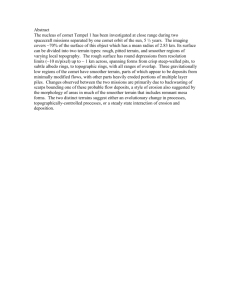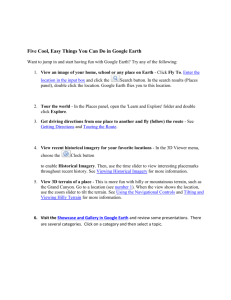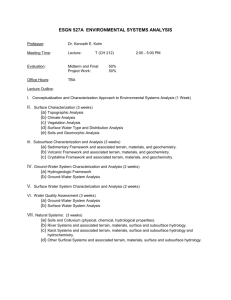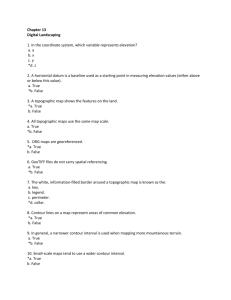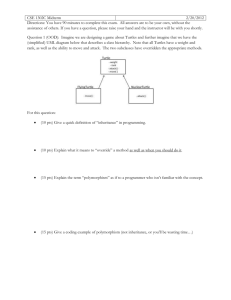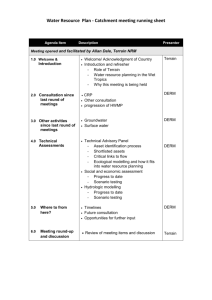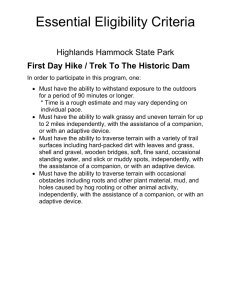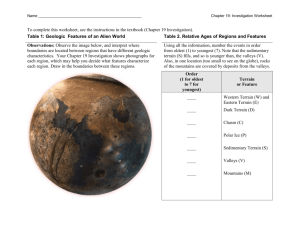Degraded Terrains Rehabilitation
advertisement
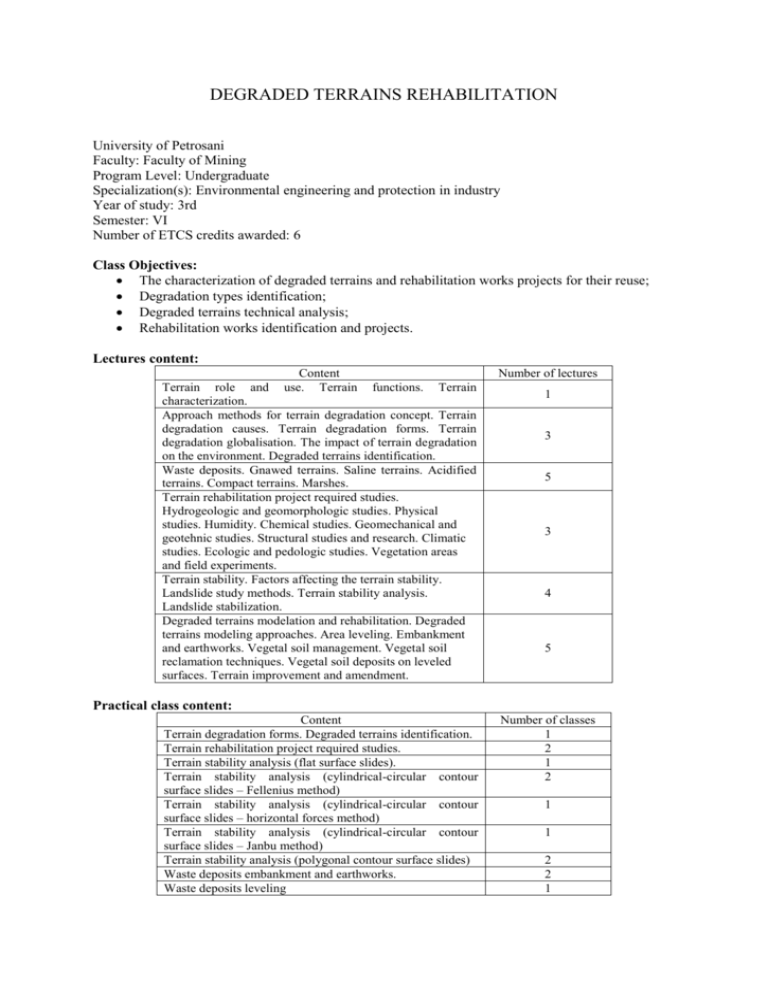
DEGRADED TERRAINS REHABILITATION University of Petrosani Faculty: Faculty of Mining Program Level: Undergraduate Specialization(s): Environmental engineering and protection in industry Year of study: 3rd Semester: VI Number of ETCS credits awarded: 6 Class Objectives: The characterization of degraded terrains and rehabilitation works projects for their reuse; Degradation types identification; Degraded terrains technical analysis; Rehabilitation works identification and projects. Lectures content: Content Terrain role and use. Terrain functions. Terrain characterization. Approach methods for terrain degradation concept. Terrain degradation causes. Terrain degradation forms. Terrain degradation globalisation. The impact of terrain degradation on the environment. Degraded terrains identification. Waste deposits. Gnawed terrains. Saline terrains. Acidified terrains. Compact terrains. Marshes. Terrain rehabilitation project required studies. Hydrogeologic and geomorphologic studies. Physical studies. Humidity. Chemical studies. Geomechanical and geotehnic studies. Structural studies and research. Climatic studies. Ecologic and pedologic studies. Vegetation areas and field experiments. Terrain stability. Factors affecting the terrain stability. Landslide study methods. Terrain stability analysis. Landslide stabilization. Degraded terrains modelation and rehabilitation. Degraded terrains modeling approaches. Area leveling. Embankment and earthworks. Vegetal soil management. Vegetal soil reclamation techniques. Vegetal soil deposits on leveled surfaces. Terrain improvement and amendment. Number of lectures 1 3 5 3 4 5 Practical class content: Content Terrain degradation forms. Degraded terrains identification. Terrain rehabilitation project required studies. Terrain stability analysis (flat surface slides). Terrain stability analysis (cylindrical-circular contour surface slides – Fellenius method) Terrain stability analysis (cylindrical-circular contour surface slides – horizontal forces method) Terrain stability analysis (cylindrical-circular contour surface slides – Janbu method) Terrain stability analysis (polygonal contour surface slides) Waste deposits embankment and earthworks. Waste deposits leveling Number of classes 1 2 1 2 1 1 2 2 1 Vegetal soil reclamation techniques. Vegetal soil deposits on leveled surfaces. Terrain improvement and amendment. 1 Project class content: Content Scale graphical presentation of waste deposits (plan representation and transverse-longitudinal sections). Stability analysis of waste deposits using the initial condition methods presented in practical class. The influence of the external factors on the waste deposits stability (overloads, seismic shocks influence, rocks pore water). Waste deposits embankment and earthworks projecting (for increasing the stability reserve and for ensuring the agricultural, forest, tree and viticultural rehabilitation required conditions). The calculation of the needed materials for the embankment and earthworks. Waste deposit scale graphical presentation after the embankment and earthworks. Stability analysis of waste deposits using the methods presented in practical class after the embankment and earthworks. Leveling works projects. The calculation of the needed materials for the leveling works. The calculation of the vegetal soil volume required for the degraded terrain rehabilitation works. Improvement, amendment and fertilization works for waste deposits. Choosing the machines needed for the embankment, earthworks, leveling and vegetal soil deposit works. Plantation works. The graphic with work times. Project delivery and presentation Number of classes 1 1 1 1 1 1 1 Grading Policy: The students pass the class if he obtains mark 5 (out of 10). Final mark shares: - lectures – 60%; - practical class – 40%. Minimum required knowledge for obtaining mark 5: - knowing the degraded terrain types and their degradation reasons; - knowing and explaining the effects of terrain degradation on the vegetation; - comparing the terrain stability analysis methods; - knowing the terrain rehabilitation and remodeling techniques. Classroom Rules of Conduct: Turn off (or place on vibrate) cell phones and pagers during class; During exams, the use of cell phones, pagers, PDAs, or any other electronic devices is strictly.prohibited Professor: Maria LAZĂR e-mail: maria.lamar@gmail.com
